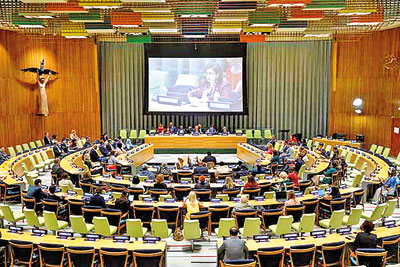Sunday Times 2
UN’s world leaders meeting falls short of gender empowerment
View(s):By Thalif Deen
Among the 190 speakers, there were only 23 women, “a figure that represents around 10 percent of leaders who participated this year”, according to the UN.
The President of the General Assembly Csaba Kőrösi of Hungary struck a note of political consolation when he said: “But though their numbers are small, women leaders “pack a punch”, to quote former New Zealand Prime Minister Helen Clark, who moderated this year’s first General Assembly Platform of Women Leaders”.
But the reaction from rights activists and civil society organisations (CSOs) was mostly negative.

UN Women Executive Director Sima Bahous addresses the inaugural meeting of the UNGA Platform of Women Leaders at UN Headquarters during the 77th session of the UN General Assembly, 20 September 2022. Credit: UN Women/Ryan Brown
Antonia Kirkland, Global Lead on Legal Equality at Equality Now, told IPS “the dismal number of women leaders speaking at UNGA this year is very worrying given the regression on women’s rights in many parts of the world, including in the United States, where the UN General Assembly meets”.
There is a well-documented correlation, she said, between peace and security generally, economic development and women’s rights, and this has an impact on everyone.
“The low number of female leaders speaking at UNGA is less than half the already low number of women parliamentarians worldwide (just over 26% according to IPU).”
“And as it becomes harder and harder for civil society to access the United Nations, women’s rights organisations have less of an opportunity to hold governments accountable to their legal obligations and commitments to ensure gender equality,” Kirkland declared.
The criticisms come amid longstanding complaints about how women are marginalised at the highest levels of the UN since its creation.
The male-female ratio for the Secretary-General stands at 9 vs zero. And the Presidency of the General Assembly (PGA), the highest policy-making body at the UN, is not far behind either.
The score stands at 73 men and 4 women as PGAs– even as the General Assembly elected another male candidate, as its 77th President, and who serves his one-year term beginning September 2022.
Since 1945, the only four women elected as presidents were: Vijaya Lakshmi Pandit of India (1953), Angie Brooks of Liberia (1969), Sheikha Haya Rashed Al-Khalifa of Bahrain (2006) and Maria Fernando Espinosa Garces of Ecuador (2018).
Meanwhile, women Heads of State and Government met on the sidelines of the UN General Assembly (UNGA) High-level Week to discuss global issues in the newly created UNGA Platform of Women Leaders.
The event, under the theme of “Transformative solutions by women leaders to today’s interlinked challenges”, highlighted the fact that women’s full and effective political participation and decision-making are crucial to addressing global priorities effectively, decisively, and inclusively, according to UN Women.
With the presence of President Katalin Novák of Hungary, Prime Minister Sheikh Hasina of Bangladesh, Prime Minister Katrín Jakobsdóttir of Iceland, Prime Minister Fiam Naomi Mata’afa of Samoa, and Prime Minister Robinah Nabbanja of Uganda, as well as Prime Minister Evelyna Wever-Croes of Aruba and Prime Minister Silveria E. Jacobs of St. Maarten, and former Prime Minister Helen Clark of New Zealand, the event was hosted by the Office of the President of the General Assembly and UN Women, in cooperation with the Council of Women World Leaders (CWWL).
Purnima Mane, a former Deputy Executive Director of the UN Population Fund (UNFPA) and UN Assistant-Secretary-General, told IPS that in June 2022, the UNGA passed a resolution commemorating the International Day of Women in Diplomacy which acknowledged the contribution of women globally at all levels of decision-making and their work for the achievement of sustainable development, peace and democracy.
“And yet, we recognise that women are grossly under-represented at most levels in the UN including national delegations and senior levels of the diplomatic corps.”
While women’s political representation at senior levels is on the rise in many countries over the last few years, especially women serving as heads of State, she pointed out, it still has a long way to go with only 28 of the 193 member states having Women heads of State of government.
This low representation of women was evident in the recent UNGA session, she said.

